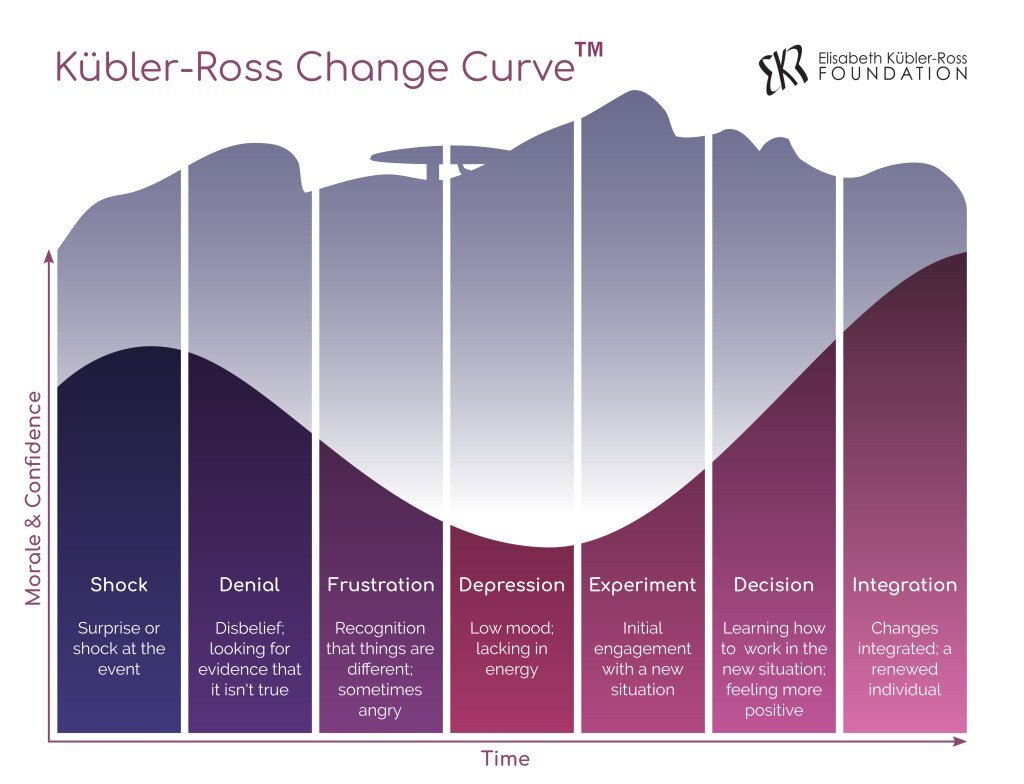93,705 and 8.4 and 56.4 million. What do these three numbers have in common? Unfortunately, they all represent loss.
As of September 13th 2020, there have been 193,705 deaths due to COVID in the United States. The unemployment rate last month was 8.4%. And 56.4 million students will miss out on having a normal fall semester this school year. (This time of year also reminds me of a personal loss, since my mother passed away from cancer just before I started my senior year of college.)
With all this loss looming around us, it is easy to feel lost. But there is a way to get our bearings – and that is with the five stages of loss.
ALL THE WORLD’S A STAGE
The five stages of loss – also known as the five stages of grief – were introduced in 1969 by psychiatrist Dr. Elisabeth Kübler-Ross. In her bestselling book On Death and Dying, Dr. Kübler-Ross explores the coping mechanisms people use when they face the end-of-life.
Although she describes various aspects of the grieving process, what stands out is her outline of five “stages”: denial, anger, bargaining, depression and acceptance.
Like most things in life, however, there is no right way to experience loss. In fact, the framework has faced criticism for being too formulaic.
But David Kessler, who coauthored Dr. Kübler-Ross’ last book On Grief and Grieving, explains that “the stages aren’t linear and may not happen in this order.” For example, you may not experience all five stages. Additionally, Dr. Kübler-Ross points out in her last book that the stages were “never meant to help tuck messy emotions into neat packages.”
In other words, the five stages are not set in stone. They can, however, serve as guideposts as we maneuver our way through loss.

Although the five stages originated with patients in the grieving process, the Kübler-Ross Change Curve has been applied to other contexts such as employees undergoing change management at corporations. Note that this model shows different stages than the five described above. (Image: Elisabeth Kübler-Ross Foundation)
YOU ARE HERE
Maybe you are in mourning because your family member passed away from COVID. Or maybe you are collecting unemployment benefits because you got laid off. Or maybe you are praying for schools to reopen because it has been difficult to fit remote learning into your schedule.
Whatever your loss may be – a loved one, a job, a routine, or something else – the five stages offer a roadmap for navigating the rollercoaster of feelings you may be experiencing.
DENIAL
Loss of a loved one: She is not dying. She will turn around any day now.
Loss of a job: This layoff is temporary. I will have my job back in no time.
Loss of a routine: Things will get back to normal once school starts in the fall.
ANGER
Loss of a loved one: Why didn’t she listen to me and see the doctor sooner?
Loss of a job: They will never be able to replace me. They will regret letting me go.
Loss of a routine: Why am I always the one who has to take care of the kids?
BARGAINING
Loss of a loved one: If I had taken control of her medical care, she would still be here.
Loss of a job: If I had shown more initiative at work, they would have kept me.
Loss of a routine: When we move to a bigger house and have more space, things will get better.
DEPRESSION
Loss of a loved one: How will I go on without her?
Loss of a job: I feel hopeless trying to find a new job in this market.
Loss of a routine: I don’t have time for myself anymore.
ACCEPTANCE
Loss of a loved one: She is no longer suffering. She is in a better place.
Loss of a job: There are new opportunities opening up every day. I will find a better position.
Loss of a routine: My partner and I will hire a babysitter for extra help on weekdays.
LOST AND FOUND
If you identify with any of the statements above, you are not alone. We are all dealing with some form of loss right now. We are all riding different waves of this rollercoaster.
The good news is that there is nothing wrong with feeling the way you do. And there is certainly nothing wrong with you. In this moment, you are where you are meant to be on this journey through loss. There is no need to rush. Eventually, we will all find our way.
 Back to Blog Homepage
Back to Blog Homepage